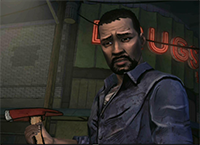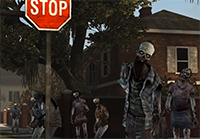The Walking Reruns
 I’m replaying through the first season of Telltale’s The Walking Dead for reasons. You may recall that it was one of my favorite games of 2012, second only to Dishonored. It beat out competition such as Mark of the Ninja, Theatrhythm, and Dragon’s Dogma on account of providing a wonderful emotional experience that had me stuttering, cringing, and about ready to cry at any moment’s notice. To me, it was a near perfect game.
I’m replaying through the first season of Telltale’s The Walking Dead for reasons. You may recall that it was one of my favorite games of 2012, second only to Dishonored. It beat out competition such as Mark of the Ninja, Theatrhythm, and Dragon’s Dogma on account of providing a wonderful emotional experience that had me stuttering, cringing, and about ready to cry at any moment’s notice. To me, it was a near perfect game.
Boy was I ever wrong.
I’ve spent years criticizing professional game reviewers for scoring games like Grand Theft Auto a perfect ten despite all of the technical flaws, glitches, and design problems plaguing the title. I now get to taste my own hypocrisy as I am left playing a game I once thought amazing, but is hardly keeping my attention this time around and is distracting me with just how clunky everything is. It is no longer the wonderful experience I remember it being, but a heavily flawed product that managed to tell a really good story.
At first I was only bothered by the game’s technical and performance issues. The first three episodes in particular are filled with frozen screens, out-of-sync audio, camera glitches, and sudden framerate drops at any moment. Perhaps it is a result of some technical mumbo jumbo, such as how information is stored in the system memory or how the code is optimized, but it is much harder to ignore this time around.
I’m perfectly aware that this could largely in part be a result of my playing on the Playstation 3. It is, after all, a difficult platform to develop for. Telltale is also a smaller game studio with far fewer employees than a lot of other game developers out there. Yet we’re talking about a game series that has been adapted for iOS and other portable, less powerful devices. This is a game with smaller environments than Borderlands, yet has greater performance issues. It can’t simply be a result of the multiple choices, either, as Mass Effect even handles those better.
Again, I acknowledge that Telltale is a smaller company, but this is a single engine that they’ve developed to work across multiple games. While they had to make adjustments to it exclusively for The Walking Dead, there should be a team whose entire purpose is to optimize the engine to be top-notch on as many platforms as they can develop for. Instead, it feels as if they simply got it working to a point where it functioned “good enough” and moved on.
This is not an accusation, but it is certainly the impression given.
If that was all the problem there was, however, I’d be able to get over it. In fact, I’d have finished replaying the first season by now. Unfortunately the story is simply not enough to carry me through a second play of The Walking Dead, at least not on the edge of my seat. Well, unless I’m slumping over, resting my chin on my desk as my eyelids begin to droop with sleepiness.
The Walking Dead is paced like many stories; periods of intense, fast-paced action followed by calm, weary scenes allowing the characters and audience to regroup. Yet there is always a danger, a fear of the unknown in The Walking Dead that makes any new environment just a little bit uneasy.
This doesn’t work when you already know what’s going to happen.
These moments of calm have a tendency to drag the rest of the game down, and as they are often structured around puzzles (many of which require the player to march from one location to another, extending the sequence to frustrating lengths), you cannot just move on as quickly as you’d like. What became a moment to gather your thoughts and calm down has now become a tedious break in action, which also makes the entire episode feel unnecessarily padded or meandering.
 That’s not to say I’m completely bored with the game now. Whenever there’s an intense sequence with an argument, such as the arrival to the pharmacy in the first episode or Lee’s encounter in the sewers of Savannah, it becomes exciting again. When the story is progressing in some fashion, and the player is involved, the game continues to shine.
That’s not to say I’m completely bored with the game now. Whenever there’s an intense sequence with an argument, such as the arrival to the pharmacy in the first episode or Lee’s encounter in the sewers of Savannah, it becomes exciting again. When the story is progressing in some fashion, and the player is involved, the game continues to shine.
Otherwise, it’s the quick bursts of gameplay that provide any sense of fun. That ten-second segment where you had to try shooting zombies in the head without a crosshair, or having to puzzle your way past a horde of the undead without getting spotted. Those moments are much more involved for the player.
Yet everything else, even the puzzles that felt too abstract during a first playthrough, become so easy and simple that you yearn for a shortcut. To just skip right past and get back to the exciting part.
I suppose you could argue that this is the nature of the adventure game, that once you know the solution or what happens then the fun is gone. Despite my occasional problems with the Phoenix Wright series, I would actually use those games as a counter-argument. Last year I had played through the first two titles a second time, and while I remembered many of the solutions and puzzles from my initial playthroughs, I still found myself addicted to each court case.
Telltale did an incredible job at getting me invested in their story of The Walking Dead, and I’m still finding a lot of great material for my next RamblePak video. However, it has been a chore going through it a second time with very brief moments of engagement. Not “fun”, but moments where I am actively engaged by the setting, the story, and the gameplay.
It makes me wonder if many gamers and critics, professional, amateur, and enthusiast, were so desperate for something artistic and meaningful that we forgot video games are a package deal. I have not played Gone Home, but from what I have heard and read I have to imagine it is a similar situation. We’re all so desperate for games to “grow up” that we’re willing to forgive poor game design and technical flaws or instabilities.
Looking back, I’m not only glad I chose to give Dishonored my favorite game of the year in 2012, I’m glad I had the foresight to award it over The Walking Dead due to its sheer gameplay design. Yet it pains me to realize that I felt a game like Mark of the Ninja, a video game that I’ve enjoyed over and over again through multiple repeat plays, was determined to be less-worthy for me just because The Walking Dead almost made me cry.
Yes, there is something to be said about a story so moving as that. Too bad I’ll never feel that urge to cry a second, third, or fourth time playing the game, whereas I’ll continue to have a blast playing Mark of the Ninja, Theatrhythm, and Dishonored over and over again.


